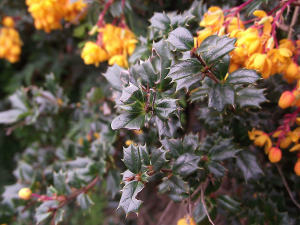EPA remains committed to deliver improved outcomes
OPINION: At the end of my first year as chair of the Environmental Protection Authority (EPA), I have been reflecting on the progress made in the time I have been in the role.
 Darwin’s barberry is a resilient noxious weed found in disturbed forests, pastures, shrubland and short tussock-land.
Darwin’s barberry is a resilient noxious weed found in disturbed forests, pastures, shrubland and short tussock-land.
The Environmental Protection Authority (EPA) has approved a rust fungus and a flower weevil to control Darwin’s barberry, a spiny invasive shrub.
Environment Canterbury, on behalf of the National Biocontrol Collective, applied to use two biological control agents to combat Darwin’s Barberry in New Zealand.
Darwin’s barberry is a resilient noxious weed found in disturbed forests, pastures, shrubland and short tussock-land. It is considered a threat to indigenous ecosystems throughout the country, as well as pastures where livestock graze.
Standard control methods like herbicides or weeding can prove costly, impractical and harmful to the environment.
It is native to Chile and Argentina and was introduced into New Zealand as a garden plant in the 1940s. Fruit-eating birds deposit seeds far from the parent bush, increasing its spread.
The plant can be found throughout New Zealand – particularly in the Canterbury, Otago, and Wellington regions.
The proposed biocontrol agents could also be used to target Darwin’s barberry elsewhere in the country.
Both the flower weevil and the rust fungus proposed for introduction are native to South America.
All organisms new to New Zealand must receive approval from the EPA before being released into the New Zealand environment.
Dr Chris Hill, general manager of hazardous substances and new organisms at the EPA, says the independent decision-making committee approved the introduction of the new organisms following “rigorous, evidence-based assessment”.
“The applicant’s risk assessment showed that these agents are highly unlikely to harm native plants or animals,” Hill says.
“The weevil does not bite or sting, so there is no health risk to people, and the rust fungus is also benign,” he adds.
Hill says the decision followed public consultation, engagement with mana whenua, and consideration of international best practice.
“New Zealand has a strong track record of using biological control agents to manage invasive weeds with minimal impact on native ecosystems," he concludes.
Global trade has been thrown into another bout of uncertainty following the overnight ruling by US Supreme Court, striking down President Donald Trump's decision to impose additional tariffs on trading partners.
Controls on the movement of fruit and vegetables in the Auckland suburb of Mt Roskill have been lifted.
Fonterra farmer shareholders and unit holders are in line for another payment in April.
Farmers are being encouraged to take a closer look at the refrigerants running inside their on-farm systems, as international and domestic pressure continues to build on high global warming potential (GWP) 400-series refrigerants.
As expected, Fonterra has lifted its 2025-26 forecast farmgate milk price mid-point to $9.50/kgMS.
Bovonic says a return on investment study has found its automated mastitis detection technology, QuadSense, is delivering financial, labour, and animal-health benefits on New Zealand dairy farms worth an estimated $29,547 per season.

OPINION: Here w go: the election date is set for November 7 and the politicians are out of the gate…
OPINION: ECan data was released a few days ago showing Canterbury farmers have made “giant strides on environmental performance”.